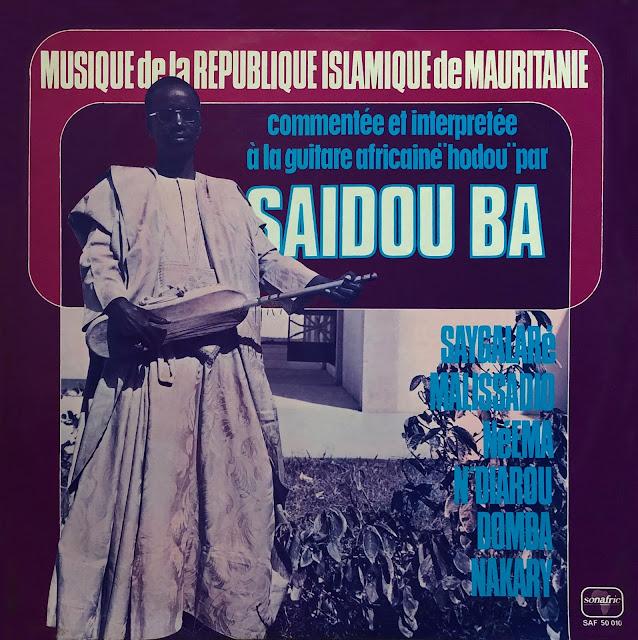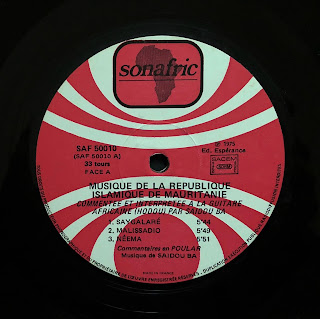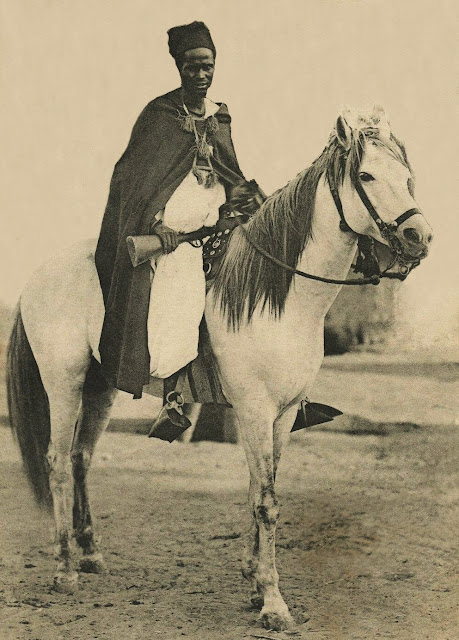MAURITANIA – MAURITANIE
Saidou Ba – Commentée et interprétée à la Guitare Africaine Hodou – Sonafric SAF 50 010, released in 1975 (LP)
This album by the brilliant hoddu lute master Saidou Bâ is my favorite recording of Fulani-Peul (or Pulaar) griot music. Deeply suffused in Peul culture, it transports listeners to the inspired, fluid and sensuous African magic of old. Bâ was born in 1939 into a family of traditional musicians in Daou, in the Gorgol region in Southern Mauritania, near the Senegal River. After his father, Hamady Coulo, a famous guitar virtuoso, died when he was still young, Bâ was sent to Wodobéré (Odobéré), Senegal, to perfect his hoddu technique and enhance his knowledge of Peul oral tradition with master musicians. Bâ quickly made his mark on the music scene, playing with prestigious traditional music ensembles, as well as launching a career as a radio-host at Radio Saint Louis and later at Radio Mauritanie in Nouakchott, the capital. Bâ was also a great teacher, offering a modern music course in Guinea for a few years in the late 1960s, and playing hoddu in l’Orchestre National de Mauritanie, which he later directed.
Cet album du brillant maître du luth hodou Saidou Bâ est mon enregistrement préféré de musique de griot peul (ou pulaar). Profondément imprégné de culture peule, il transporte les auditeurs dans cette magie africaine inspirée, fluide et sensuelle d'antan. Bâ est né en 1939 dans une famille de musiciens traditionnels à Daou, dans la région du Gorgol au sud de la Mauritanie, près du fleuve Sénégal. Après la mort de son père, Hamady Coulo, un célèbre virtuose de la guitare hodou, alors qu'il était encore jeune, Bâ fut envoyé à Wodobéré (Odobéré), au Sénégal, pour perfectionner sa technique instrumentale et étoffer ses connaissances griotiques auprès de grands musiciens. Le jeune Bâ s'impose rapidement sur la scène musicale en jouant avec de prestigieux ensembles de musique traditionnelle et en se lançant dans une carrière d'animateur radio à Radio Saint Louis puis à Radio Mauritanie à Nouakchott, la capitale. Bâ est aussi un formidable pédagogue qui est invité à donner des cours de musique moderne en Guinée pendant quelques années à la fin des années 1960. Il jouera également du hodou dans l’Orchestre National de Mauritanie, qu’il finira par diriger.
A1 – Sayglaré - A tribute to Gueladio - Hambodurion, an illustrious Peul horseman from the Ségou region, Mali, who embarked on strange and epic journeys.
A2 – Malissadio - Rivers have their mysteries. The master of the waters, inhabiting dark worlds with a million eyes, took a beautiful maiden named Mali to the underworld where death is not the end but a transfiguration. Her lover Saïdou wrote this song to mourn the loss of his beloved.
A3 – Néema - The laws of nature, occasionally cruel, follow their own esoteric logic. Fortunes change, the weak become strong, and the strong succumb to mere memories and nostalgia. Songs like this soar into the night in the face of the unfathomable.
B1 – N’Diarou - Every Peul comes alive and vibrates upon hearing the epic story of Oumarel Sawa-Dondi.
B2 – Domba - Shoemakers may be skilled craftsmen and make beautiful shoes, but the young cobbler Sylla achieved the feat of crafting the most beautiful pair of shoes between the time of two music choruses. In return, his sister composed this famous song.
B3 – Makary – This lament celebrates the memory of a young slave girl who immolated herself in the manner of a Buddhist monk. Her act of revolt gives hope to all beings experiencing the shackles and humiliation of slavery.*
*Condensed and paraphrased from the liner notes.






Merci! This is beautiful!
ReplyDelete